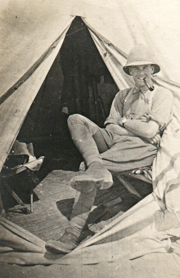Stood by at 3 o'clock and dismissed at five, nothing doing. Bathed this morning, water a bit cooler. Small mail in this morning; heard from Mrs Pellatt.
One of the officers of the Ayrshire Battery of the 1/2nd Bde. came here tonight to see our positions, as the Essex are still in quarantine. They are going to come up here temporarily to take over till the Essex are fit, and we are moving to Romani the day after tomorrow, preparatory to pushing out further, probably to El Rabah.



Mrs Pellat is Ellinor, the wife of Tom Pellatt, headmaster of Durnford School in Dorset, where Dick had attended. In the 1936 memoir, 'Boys in the Making', Tom Pellatt wrote movingly of the Great War:
'We lost fifty-one of our Old Boys; though in one sense they were not our own sons, yet in another they were something more than our own, because they were not only our 'children by adoption through grace', but they were also our work, and we had the humble claim to believe (since their parents told us so), that we had done something to get them ready, and make them what they were. Nothing could ever be in the least the same, after that loss, and when I go through the names, I find it hard to submit in a spirit of resignation-Bob Colvin, Bob Parke (who got into the Winchester Cricket XI when he was fifteen), Pip Parke his brother (who also got into; their team), Arthur and Hugh Austen-Cartmell, Gerard Fairclough, John Collins (who was in the Wellington Cricket XI and Football XV), Tom Bourdillon, Guy Napier (who bowled for the Gentlemen against the Players); my own nephew Peter Rylands, Walter Hill, Damer Wynyard, Clive Sanders (who though he had been badly wounded and invalided out three times insisted on going back), Dick Willis Fleming, Arthur Newton (who was badly wounded, and then joined the Flying Corps with his leg still in irons), Ronald Lagden the quadruple Cambridge blue. But I cannot go on with the list through my bitter tears, which have no solace in any conviction that the thing was inevitable. It need not have been, if we had listened to Lord Roberts. But we shall never listen ... A barrier of two million of these dead had first to be piled up before we had paid the price, just because we would not listen ...'
Tom Pellatt also wrote a memorial of Dick in The Durnford Memorial Book of the Great War, 1914-1918 (1922).